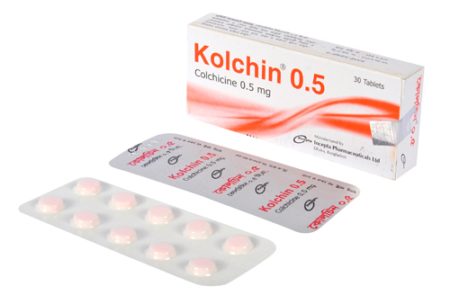
Type:10 Tablets
Generic Name:Colchicine
Manufacturer:Incepta Pharmaceuticals Ltd.
Price:৳40.00
Acute gout, Familial Mediterranean Fever, Behcet's disease, Gouty arthritis
Should be taken with food.
Gout Treatment of acute gout flares (Colcrys): 1.2 mg PO at first sign of flare, then 0.6 mg 1 hr later; not to exceed 1.8 mg in 1-hr period Prophylaxis (Colcrys, Mitigare): 0.6 mg PO once daily or q12hr; not to exceed 1.2 mg/day; after gout flare, wait 12 hr to continue prophylaxis Familial Mediterranean Fever Colcrys: 1.2-2.4 mg/day PO in single daily dose or divided q12hr; increased in 0.3 mg/day increments as necessary to control disease; decreased in 0.3 mg/day increments if intolerable side effects develop; not to exceed 2.4 mg/day Hepatic impairment (gout) Mild to moderate: Dosage adjustment not necessary; monitor patients for adverse effects Severe: Dosage adjustment not necessary; do not repeat more frequently than every 2 weeks; consider alternative therapy if repeated courses are required Hepatic impairment (familial Mediterranean fever) Mild to moderate: Monitor patients for adverse effects Severe: Consider dosage reduction; do not repeat more frequently than every 2 weeks
Gout <16 years Not recommended >16 years Treatment of acute gout flares: 1.2 mg PO at first sign of flare, then 0.6 mg 1 hr later; not to exceed 1.8 mg in 1-hr period Prophylaxis: 0.6 mg PO once daily or q12hr; not to exceed 1.2 mg/day; after gout flare, wait 12 hr to continue prophylaxis Familial Mediterranean Fever <4 years: Safety and efficacy not established 4-6 years: 0.3-1.8 mg/day PO in single daily dose or divided q12hr 6-12 years: 0.9-1.8 mg/day PO in single daily dose or divided q12hr >12 years: 1.2-2.4 mg/day PO in single daily dose or divided q12hr
Renal impairment (gout) Mild (CrCl 50-80 mL/min) and moderate (CrCl 30-50 mL/min): Dosage adjustment not necessary; monitor patients for adverse effects Severe (CrCl <30 mL/min): Dosage adjustment not necessary; do not repeat more frequently than every 2 weeks Hemodialysis: 0.6 mg once; do not repeat more frequently than every 2 weeks Renal impairment (familial Mediterranean fever) Mild (CrCl 50-80 mL/min) and moderate (CrCl 30-50 mL/min): Monitor patients for adverse effects; dosage adjustment may be required Severe (CrCl <30 mL/min): 0.3 mg/day initially; dosage increases should be done with adequate monitoring for adverse effects Hemodialysis: 0.3 mg PO once; dosage increases should be done with adequate monitoring for adverse effects
Hypersensitivity; blood dyscrasias, severe renal impairment, pregnancy, debilitated patients; SC/IM admin.
Colchicine, a phenanthrene derivative, exerts its effect by reducing the inflammatory response to the deposited urate crystals and also by diminishing phagocytosis in joints. It inhibits lactic acid production by leucocytes, thereby interrupting urate deposition and inflammatory response that sustains the acute gout attack.
Elderly; GI disease. Cardiac, renal and hepatic impairment; prolonged therapy not recommended; lactation. Lactation: Drug enters breast milk; use with caution (American Academy of Pediatrics Committee states that drug is "compatible" with nursing)
>10% Gastrointestinal (GI) effects (eg, diarrhea, nausea, cramping, abdominal pain, vomiting) (26-77%) 1-10% Fatigue (1-4%),Gout (0-4%),Pharyngolaryngeal pain (2-3%),Headache (1-2%)
Pregnancy Available human data from published literature on colchicine use in pregnancy over several decades have not identified any drug-associated risks for major birth defects, miscarriage, or adverse maternal or fetal outcomes Lactation Colchicine is present in human milk No adverse events in breastfed infants in the published literature after administration of colchicine to lactating women No data available on the effects of colchicine on milk production Consider developmental and health benefits of breastfeeding along with the mother’s clinical need for the drug, and any potential adverse effects on the breastfed infant from the drug or from the underlying maternal condition Infertility Case reports and epidemiology studies in males on colchicine therapy indicate that infertility from colchicine is rare and may be reversible
Reversible malabsorption of vitamin B12 may occur because of ileal mucosal function alteration. Response to CNS depressants and sympathomimetics may increase when used concurrently with colchicine. Increased risk of myopathy when used concurrently with simvastatin. Potentially Fatal: With ciclosporin, increased risk of nephrotoxicity and myotoxicity. Risk of colchicine toxicity when used with macrolides.